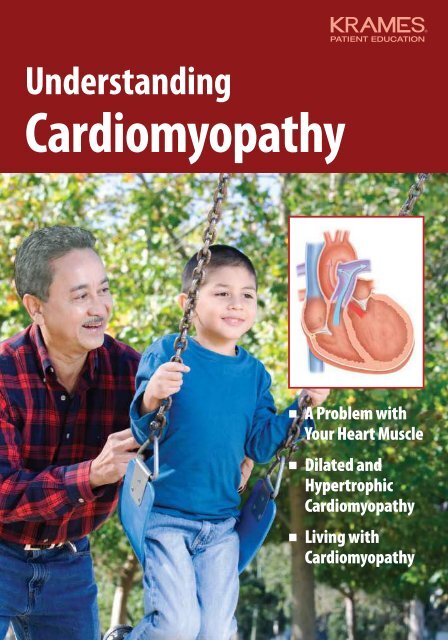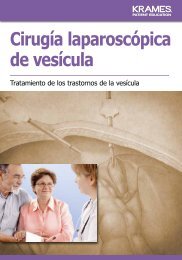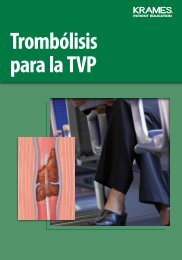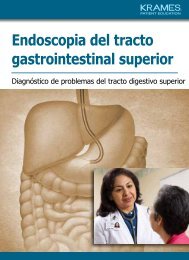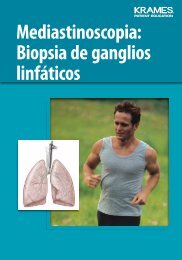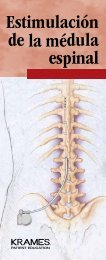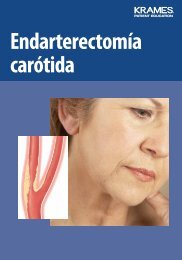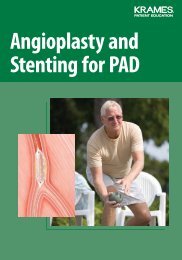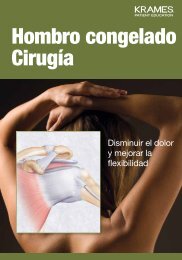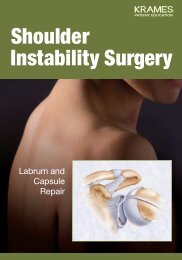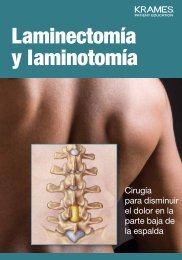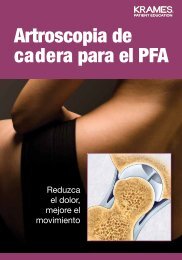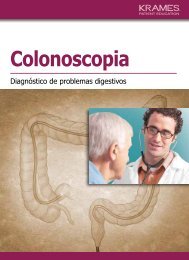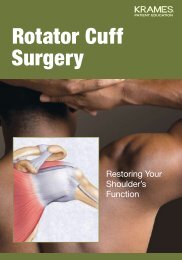Understanding Cardiomyopathy - Veterans Health Library
Understanding Cardiomyopathy - Veterans Health Library
Understanding Cardiomyopathy - Veterans Health Library
You also want an ePaper? Increase the reach of your titles
YUMPU automatically turns print PDFs into web optimized ePapers that Google loves.
<strong>Understanding</strong><strong>Cardiomyopathy</strong>■ A Problem withYour Heart Muscle■ Dilated andHypertrophic<strong>Cardiomyopathy</strong>■ Living with<strong>Cardiomyopathy</strong>
What Is <strong>Cardiomyopathy</strong>?If you have cardiomyopathy, you have a problem with the muscletissue that makes up your heart. <strong>Cardiomyopathy</strong> means “heartmuscle disease.” Your heart may not be pumping as well as itshould. You and your doctor can work together to help your heart.Read on to learn more about cardiomyopathy.Types of <strong>Cardiomyopathy</strong>With dilated cardiomyopathy, the heart thins and enlarges. Thisis the most common type. With hypertrophic cardiomyopathy, theheart muscle thickens. It is often found in young, active people. Withrestrictive cardiomyopathy, the heart muscle becomes hard and stiff.This type is very uncommon.Symptoms of Dilated <strong>Cardiomyopathy</strong>Common symptoms include:■ Shortness of breath when you exert yourself■ Unexplained tiredness or weakness■ Chest pain■ Fluid buildup in the lungs. You may need extrapillows to help you breathe when you lie down.■ Fluid retention resulting in swollen feet orankles or unexplained weight gainSymptoms of Hypertrophic <strong>Cardiomyopathy</strong>Hypertrophic cardiomyopathy often causes nosymptoms. If symptoms do occur, they often happenwhen you exert yourself. Symptoms may include:■ Problems catching your breath■ Unexplained tiredness■ Lightheadedness, dizzy spells, or fainting■ Rapid, pounding heartbeat■ Chest tightness or pressure■ Fluid retention resulting in swollen feet orankles or unexplained weight gain2
Evaluating Your ConditionTo learn more about your heart, your doctor will examineyou. He or she will also ask questions about your health,your habits, and your family history. Tests are also likelyto be done. These may include:■ Electrocardiogram (ECG or EKG)to show the pattern of your heartbeat.■ Echocardiogram to show the size andshape of your heart. This test also showswhether or not your heart is pumpingnormally. The amount of blood pumpedinto your body with each heartbeat iscalled an ejection fraction.■ Cardiac catheterization or a nuclearscan if more information is needed. Thesetests can show the health of the heartmuscle and how well blood flows throughthe heart’s vessels.During an echocardiogram, soundwaves are used to show an imageof the heart on a monitor.Your Treatment Plan<strong>Cardiomyopathy</strong> doesn’t go away. But it can be treated. Treatmentcan help keep cardiomyopathy from getting worse, and can reduceyour symptoms. Treatment can also help prevent heart failure.(Heart failure happens when the heart muscle weakens so much thatit can’t move enough blood. Fluid then builds up in the lungs and therest of the body.) Your doctor will work with you to develop a treatmentplan to help you feel better now and prevent problems in the future.3
A Change in How Your Heart PumpsThe heart is a muscle that squeezes to pump blood through thebody. Four chambers hold blood as it moves through the heart.The right chambers pump blood to the lungs. There, the bloodreceives oxygen. Oxygen-rich blood then travels to the left chambersand is pumped to the rest of the body. With cardiomyopathy, theheart muscle is damaged and doesn’t pump as well as it should.Left atriumThe right atriumis one of the twoatria, or upper heartchambers. The atriareceive blood fromthe body. The atriasend the blood tothe ventricles.A valve separateseach atrium from eachventricle. The hearthas four valves. Theykeep blood movingin the right directionthrough the heart.Right ventricleWhat Causes <strong>Cardiomyopathy</strong>?In many cases of cardiomyopathy, an exact cause is never known.Possible causes of dilated cardiomyopathy include:■ Coronary artery disease (narrowing of the heart’s blood vessels).The resulting damage to the heart muscle is often known asischemic cardiomyopathy.■ Heavy alcohol use over a long period of time■ Infection or inflammation of the heart muscle■ Use of certain cancer medications■ High blood pressureThe septum is partof the heart muscle.It divides the right andleft sides of the heart.■ Problems for a woman during pregnancy and childbirthHypertrophic cardiomyopathy is a genetic disorder that is sometimespassed from one generation to the next.The left ventricleis one of the twolower heart chambers.The ventricles receiveblood from the atria.The left ventricle sendsthe blood out to therest of the body.4
When You Have <strong>Cardiomyopathy</strong>Enlarged leftatriumWeakenedmuscle wallWith dilated cardiomyopathy, theheart muscle has been damaged. Adamaged heart muscle cannot move asmuch blood as before. To try to pumpenough blood, the heart muscle stretchesso it can hold more. The chambers,especially on the left side of the heart,often dilate (get larger). Larger chambersmay help move more blood for a while.But, in time, the stretched-out musclegets even weaker and tires out.Enlarged leftventricleThickenedmuscle wallThickenedseptumWith hypertrophic cardiomyopathy,the heart muscle grows thicker andstiffer than normal, especially thewalls of the left ventricle and septum.Thickened muscle walls mean chambershold less blood. Thick walls may alsoblock blood flow and damage valves. Astiff heart muscle can’t relax betweenpumps the way it should, so less bloodmoves with each pump. Also, the heartmay sometimes beat irregularly (toofast and out of rhythm).5
Living with <strong>Cardiomyopathy</strong>Your doctor will outline a treatment plan to help you live betterwith cardiomyopathy and stop it from getting worse. Be sureto follow your doctor’s instructions. You can also make somelifestyle changes that will help your heart.Follow Your Treatment PlanYour treatment plan may include:■ Making lifestyle changes such as balancing activity and rest, quitting smoking,and tracking your weight■ Eating less salt, if so instructed. Follow your healthcare provider’s advice.■ Taking medications and having medical treatmentsBe sure to visit your doctor regularly. Mention any problemsyou are having with your treatment plan. Be honest if you arenot doing something your doctor has suggested. He or shemay be able to make some changes to help your plan workbetter for you. Remember that your treatment will help youfeel better now and in the future.Balance Activity and RestHaving cardiomyopathy may mean you get tired morequickly. But this shouldn’t keep you from being active.In fact, being active may help you feel better. Talk withyour doctor about how much activity is right for you.Ask what kind of exercise you can do safely. But knowyour limits. Stop and rest if you feel tired or out of breath.Don’t push yourselftoo hard—rest whenyou feel tired.6
Medications to Help Your HeartMedications can help you to both feel better and stay as healthy asyou can. Take your medications exactly as instructed. Never stoptaking medications or change dosage unless told to by your doctor,even if you feel better.Medications for <strong>Cardiomyopathy</strong>Your doctor may prescribe one or more of thefollowing medications:ACE inhibitors help blood flow more easilyby relaxing blood vessels and lowering bloodpressure. This lets the heart pump moreblood without doing more work.Anticoagulants help prevent blood clots.Antiarrhythmics may be used to control a fastor irregular heartbeat.Beta-blockers slow the heart rate, whichlessens the work the heart has to do. Theymay also help keep the heartbeat regular.Calcium channel blockers dilate bloodvessels and slow the heart rate.Diuretics help rid the body of excessfluid. Having less fluid to pump makesa heart’s job easier. Getting rid of extrawater can also help reduce swelling,bloating, and shortness of breath.Digitalis helps the heart pump with morestrength. This helps the heart pumpmore blood with each beat. Digitalis mayalso keep the heartbeat regular.PHARMACYTalk with a pharmacist about how to useand store your medications safely.8Medical TreatmentsIf fast heartbeat is a problem, procedures (cardioversion or ablation) may bedone to help restore normal heart rate. In some cases, a special device isimplanted. This device, called an ICD (implantable cardioverter defibrillator),can monitor and control heart rhythm. If needed, an ICD can correct certaintypes of dangerous rhythms. An ICD can also be modified to coordinate musclefunction between both sides of the heart (biventricular pacing). Surgery on theheart valves or the heart muscle wall can correct problems with blood flow. Forthose who are very sick, a heart transplant may be an option. Your healthcareprovider will tell you about any of these treatments that might be right for you.
Tips for Taking YourMedicationsMedications only work if you take themon time and as directed. Make taking yourmedications part of your daily routine.To help you do this, try these tips:■ Read and follow the directions on theprescription label.■ Get a pillbox marked with the days ofthe week. Fill the pillbox at the start ofeach week. Then open each section totake your pills for that day.■ Take your medication at the same timeor times each day. Make it a habit.■ Don’t run out of medication. Ordermore medication when you have aone- to two-week supply of pills left.■ Be sure to bring your medications withyou when you travel.■ Have a list of the medications you take.Show the list to any doctor you visit fortreatment. Also show it to the pharmacistbefore you buy over-the-counter orprescription medication.■ If you can’t or won’t take your medicationfor any reason, tell your doctor.A pillbox can help you keep trackof your medications.Take your medication at the sametime each day.Coping with Side EffectsSome of the medications you take may cause side effects. Side effectsmay include nausea, dry cough, dizziness, muscle cramps, or changesin your heartbeat. If you have any of these or other symptoms thatbother you after starting a medication, tell your doctor right away.Your doctor may be able to adjust your dosage or give you a differentmedication. Never stop taking your medication or change yourdose on your own.9
Eating Less SaltYour doctor may have told you to eat less salt. Salt is the mainsource of sodium in our diet. Too much sodium can make thesymptoms of cardiomyopathy worse. Cutting back on the amountof salt you eat may help you feel better. Try the tips on thesepages to get started.When Cooking■ Look for low-salt recipes. They are healthyfor your heart and can taste good, too.■ Don’t add salt to food when you’recooking. Instead, season your foods withhigh-flavor ingredients such as pepper,lemon, garlic, and onion.■ Cook with fresh foods. When foods areprocessed and put into boxes or cans, a lot ofsalt is often added. Stick with foods that arefresh or frozen without any added seasonings.■ Take the saltshaker off the table. Beforelong, you’ll learn to enjoy food without addedsalt. You might also try salt substitutes, butask your doctor first.Try herbs instead of salt to bring outflavors during cooking.10Call the restaurant ahead of time and askwhether it serves low-sodium dishes.When Eating Out■ Request that your food be cookedwithout added salt. Most restaurantsare happy to meet special requests. Ifyou aren’t sure, call ahead and ask.■ Limit your use of condiments.Ketchup, mustard, soy sauce, steak sauce,and salad dressings all contain too muchsodium. On salads, try lemon juice orvinegar and oil instead.■ Avoid eating in fast-food restaurants.Fast food is often high in salt. If you do eatfast food, ask for a nutrition informationguide. Read it before ordering and makea low-sodium choice.
When Shopping■ Read labels before buying packagedfoods. Check the serving size and thenumber of mg (milligrams) of sodium ineach serving. Try to keep sodium under2,000 mg a day unless your doctor tellsyou otherwise.■ Check for high-sodium ingredients.These include monosodium glutamate(MSG), brine, sodium chloride, andbaking soda. Avoid foods with high-sodiumingredients near the top of the list.■ Avoid processed foods. Foods that areprecooked or prepared are often high insodium. Avoid foods that are pickled, aged,smoked, or cured.■ Select fresh or frozen foods withoutadded seasonings. If you choose cannedfoods, look for salt-free versions.Canned foods are often high in sodium,so remember to check labels.■ Choose low-salt snacks such as unsaltedpretzels or crackers, air-popped popcorn,frozen juice bars or sherbet, or yogurt.■ Buy low-salt breakfast foods, such asfruit or fruit juice, bread, hot cereal (notinstant), or shredded wheat.■ If you use antacid tablets, choose abrand that is sodium-free.Avoid these High-Sodium FoodsRefer to this list for some foods that are often high in sodium:• Canned fish• Canned vegetablesand soups• Cheese• Crackers• Cured meats (such asham or bacon)• Fast-food burgers• French fries• Lunchmeats• Mustard, ketchup• Nuts, salted• Pancakes from mix• Pickled foods• Potato or tortilla chips• Pretzels, salted• Pudding, instant• Relish• Sauerkraut• Smoked meats and fish• Tomato juice11
Making the Most of LifeHaving cardiomyopathy doesn’t mean you have to stop doing allof the things you enjoy. Although you’ll always need to follow yourtreatment plan, you can continue to be active. So feel free to planspecial outings and spend time with your friends and family.This product is not intended as a substitute for professional medical care.Only your doctor can diagnose and treat a medical problem.2211173 ©2010 The StayWell Company. www.krames.com 800-333-3032 All rights reserved.0909


